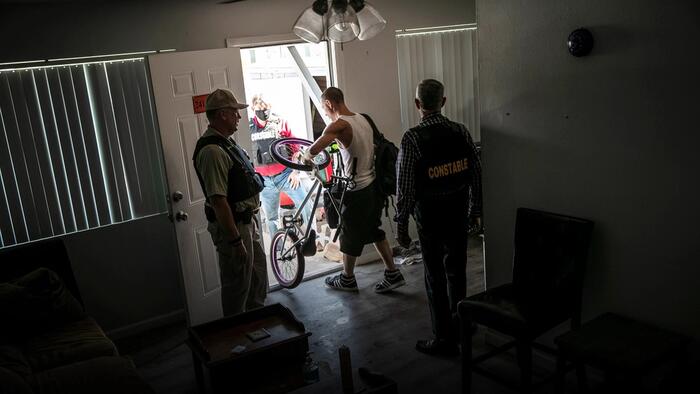In urban areas like Phoenix, handling itinerant squatters has become a significant challenge for property managers, as highlighted by Calvin Favata from Your Holdings. With growing incidents of squatting amid rising homelessness and soaring rental costs, property management risks have surged. Rashaad Johnson, a tenant in one of Favata’s properties, was well-acquainted with some of the squatters from a vacant home nearby, even allowing them to use his shower. However, this seemingly benign act spiraled out of control when an altercation arose over access to the shower, ultimately leading to Johnson’s tragic death at the hands of a squatter in body armor. Favata emphasized the horror of such violence erupting over something as trivial as a shower, prompting him to bolster security measures at his properties, including installing new locks and cameras.
The increase in squatters has been particularly pronounced in Phoenix, where Favata noted that nearly any vacant home, regardless of condition, seems to attract individuals seeking shelter. Problems escalate as squatters often vandalize, steal plumbing, and create unsafe living conditions. Scott Blake, a constable in the Hassayampa District of Maricopa County, echoed Favata’s concerns, reporting that confrontations involving squatters have become alarmingly frequent. With the onset of seasonal migration, as many residents vacate their homes for cooler climates in summer, a disturbing number of squatters take advantage of these opportunities. Unfortunately, Blake’s accounts reveal a harsh reality: although many squatters leave when confronted by law enforcement, the potential for violence remains ever-present, exemplified starkly by Johnson’s case.
Media reports from other states have similarly shed light on escalating confrontations related to squatter issues, particularly highlighting violent incidents in New York and California. Recent stories detail alarming events, such as a tenant being killed by squatters in New York and home assaults in Los Angeles. Such tragedies underline the dire consequences of squatting, not only for property owners but also for legitimate tenants and nearby residents. The fear surrounding squatting has stirred public attention and calls for improved handling of the situation, especially the implications of failing to secure vacant properties effectively.
Legal complexities further complicate the predicament faced by property owners and managers dealing with squatters. Each state has its own statutes governing the eviction process and squatters’ rights. In Arizona, for instance, squatters can make eviction arduous once they occupy a property. The legal concept of “adverse possession” allows some squatters to eventually claim ownership of a property after living there for a specified duration under specific conditions. In Phoenix, a Notice to Vacate can initiate a formal eviction process, but it can still take up to three weeks to legally remove squatters, exposing property owners to extended periods of unauthorized occupancy.
The squatting issue is not confined to Arizona; California has experienced a surge of similar concerns, with reports indicating that significant numbers of properties are affected nationwide. Organizations like the Apartment Association of Greater Los Angeles have raised alarms about squatters causing severe damage and even posing risks to property owners. In a landscape where finding a swift resolution for property owners can often feel overwhelming, the consequences of ineffective handling can be dire, leading to not just financial losses but also profound emotional distress for those impacted.
As the situation evolves, some observers point to the internet and social media as being partly culpable for rising squatter incidents, providing platforms for individuals seeking advice on exploiting homes legally and illegally. Often, squatters may present fabricated documentation to law enforcement, which complicates police interventions by framing the issue as a civil matter. Increasing awareness of the dangers and complexities surrounding squatting is essential for fostering effective discussions on solutions, encouraging landlords, property managers, and lawmakers to collaborate in restoring safety and security in neighborhoods heavily affected by this trend. Properly addressing the multifaceted squatter crisis calls for community-wide efforts to balance housing needs while protecting property rights, mitigating violence, and establishing safer living environments for all.

